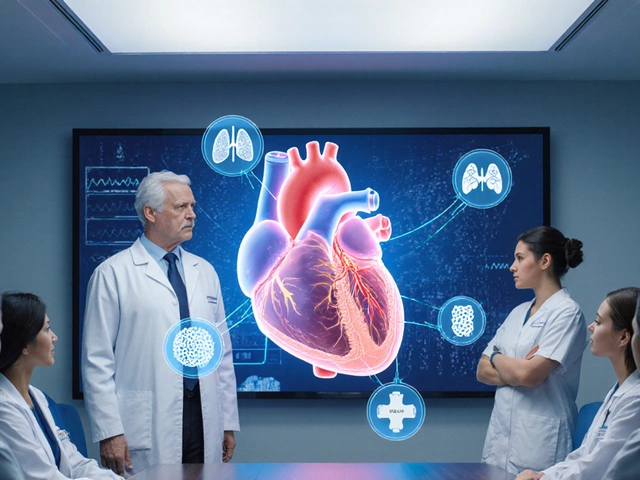Imagine needing to calm your nerves but not wanting—or unable—to get a Xanax prescription. Maybe it’s a work deadline that’s burning holes in your gut. Maybe it’s social situations that seem more daunting than climbing Everest. The frustrating part? Walking into a pharmacy, you won’t find that blue oval pill without a doctor’s blessing. But here’s the twist: Over 40% of people with mild to moderate anxiety never try prescription meds, mainly because of all the red tape, side effects, or that nagging fear of dependency. It’s not surprising that every other article or forum is crammed with the question: What works like Xanax over the counter? Let’s sort out the real from the ridiculous and see what your options actually look like.
The Hunt for Over-the-Counter Xanax Alternatives: What’s Out There?
The truth is, you can’t just waltz into a pharmacy and pick up something that matches Xanax milligram for milligram. Xanax (alprazolam) is a prescription benzodiazepine and it’s regulated for good reason. It packs a punch—fast action, real relaxation, but also a high risk for dependency and some pretty gnarly withdrawal symptoms if not used carefully. Now, does that mean you’re stuck chewing your nails through every anxious moment? Not at all. The market for anxiety is booming, and there are plenty of options that claim to be the next best thing—some backed by research, others relying on glowing Instagram testimonies.
Over-the-counter (OTC) options fall into a few buckets. You’ve got supplements like valerian root, L-theanine, magnesium, and ashwagandha. There are teas and tinctures: chamomile, passionflower, lavender. Then there’s the world of CBD, which exploded since the 2018 Farm Bill. Some folks even turn to non-prescription sleep aids like diphenhydramine or doxylamine because they can cause a familiar sense of calm—but with their own set of risks.
It’s not all natural stuff either. In some countries outside the US, you’ll find low-dose antihistamines and even mild sedating antihypertensives on the shelf. But let’s focus on what you actually get in a typical US or UK store and which ones actually have science behind them—no wishful thinking.
- L-Theanine — This is an amino acid found in green tea. It doesn’t make you drowsy, but boosts alpha brain waves, leading to relaxation without sedation. A 2019 randomized trial in the Journal of Psychiatric Research found it did help with mild anxiety after a couple of weeks, though the effect was milder than prescription meds. Still, it’s a go-to for people who want to feel calmer but stay alert.
- Valerian Root — This classic “natural Valium” has been used for centuries. A meta-analysis in 2020 found mixed results. Some people swear it eases their tension, others feel just as jumpy. It’s definitely no Xanax, but it might take the edge off if you’re wound up before bedtime.
- Ashwagandha — This adaptogen from traditional Ayurveda has gotten loads of buzz. A 2019 study in Medicine found that 240 mg daily for two months reduced anxiety scores almost 44% compared to placebo. The catch? Results kick in slowly and you need to be consistent.
- CBD (Cannabidiol) — Legal gray zones aside, pure CBD from hemp is widely used for stress. Studies like the 2019 case series published in The Permanente Journal showed about 79% of people with anxiety reported improvement after a month of CBD use. But dosage matters—too low, and you’re basically drinking olive oil.
- Magnesium — If you’re deficient (and up to half of people are), topping up can make a difference for mood and muscle tension. A 2017 review in PLoS One tied magnesium supplementation to better anxiety control, at least in folks who started out with low levels.
- Diphenhydramine/Doxylamine — These are sedating antihistamines, popular in OTC sleep aids. They don’t treat anxiety directly but can make you feel sleepy and less wired. They’re not meant for daily use, can make you groggy, and should never mix with other sedatives.
Here’s a quick comparison table for the most common OTC options:
| Substance | Mechanism | Onset | Best for | Risks |
|---|---|---|---|---|
| L-Theanine | Alpha brain wave modulation | 30-40 mins | Daytime jitters | Almost none |
| Valerian Root | GABA boost | 1-2 hours | Sleep-related anxiety | Grogginess, odd dreams |
| Ashwagandha | Reduces cortisol | 2-8 weeks | Chronic stress, burnout | Thyroid effects |
| CBD | Endocannabinoid system | Varies (15-90 mins) | Social/short-term anxiety | Legal concerns, purity questions |
| Magnesium | NMDA and GABA support | 2-6 weeks | Muscle tension, mild anxiety | Digestive upset if overdosed |
The common thread? Nothing matches that “ahhh” of Xanax in a pill form, instantly. Most real OTC options do their best work with regular use. Single-dose “crisis mode” fixes are, frankly, rare. That’s both a disappointment and a hidden blessing: you dodge dependency and often, the foggy-headed side effects.

Science-Backed Tips to Boost Natural Calm—No Prescription Needed
Sure, supplements can help, but raw pills won’t solve what’s tangled in your mind and body. Science keeps pointing back to lifestyle and daily habits as anxiety’s real kryptonite—often more effective than the mild stuff you’ll find on your neighborhood pharmacy shelf. Looking for a reliable, consistent sense of peace? It’s not just about what you pop, but what you practice. Check this out: the 2022 World Mental Health Report from the WHO flagged that regular movement—the fancy kind called “exercise”—is actually a first-line remedy for anxiety, even before meds are offered in mild cases. It sounds boring, but works shockingly well.
- Move regularly. Maybe it’s not your thing, but people who squeeze in 30 minutes of brisk walking, biking, or dancing 5x a week report nearly 60% fewer anxious days, according to a 2021 JAMA Psychiatry trial. If a gym isn’t your vibe, try home YouTube workouts or treadmill walking while watching Netflix. Just get moving.
- Meditation or breathwork. Mindfulness has gone from “woo-woo” to mainstream for good reason. Practicing 10 minutes of guided meditation or just box breathing (inhale for 4, hold for 4, exhale for 4, hold for 4) saw lowered anxiety scores within two weeks in a University of Massachusetts study. No need for incense or chanting. Just quiet, steady breathing does the trick.
- Limit caffeine and alcohol. Caffeine messes with anxious brains more than you think—a double espresso can make even the calmest person jittery. Alcohol is sneaky: feels relaxing at first, but next-day rebound anxiety is brutal. Try cutting back for a week and note how your body reacts.
- Sleep matters. Adults need 7-9 hours a night; you’ve heard it all before, but it can’t be skipped. According to the American Psychological Association’s 2024 survey, folks who got solid, undisturbed sleep had half the anxiety flare-ups compared to those burning the midnight oil.
- Talk to someone. Nothing soothes a stormy mind like unloading on a trusted friend, therapist, or counselor. Digital therapy apps like BetterHelp and Calmerry saw a 300% enrollment surge since 2020—not a coincidence.
If you actually want a Xanax effect—quick, profound, and reliable—the real truth: it’s prescription territory. But most cases of “general anxiety” or stressful moments can often be managed well with a mix of OTC options and daily lifestyle tweaks. The combo counts more than the individual pieces.
"Several over-the-counter and natural products have shown mild to moderate effects in reducing anxiety, but these should never be seen as complete substitutes for prescription medications like benzodiazepines. Always talk to your healthcare provider about persistent or severe symptoms."
—Dr. Christina Bryant, Clinical Psychologist, University of Melbourne
Keep it simple: try one supplement at a time, pay attention to how your body and mood react, and skip anything that sounds too good to be true. For people coping with daily edge, the journey to calm is honestly less about miracle pills, more about the little things you do every single day. And yes, there are options—just not perfect replicas of that famous little pill.

What You Need to Know Before Trying OTC Anxiety Remedies
You know those warning labels shoved inside medicine boxes? Tiny print, screaming “talk to your doctor.” The reason is simple—just because something is sold without a prescription doesn’t mean it’s totally safe for everyone, all the time. When it comes to over-the-counter options for anxiety, a little prep work keeps you from trading one problem for another.
First, supplements aren’t regulated with the same scrutiny as prescription meds. That means what you read on the bottle isn’t always what you get. ConsumerLab’s 2023 testing of CBD oils revealed that almost 30% had either more or way less active ingredient than listed, and a few batches were contaminated with pesticides or heavy metals. If you’re buying supplements—especially online—stick to brands that third-party test for purity. Look for NSF, USP, or ConsumerLab seals on the label.
Mixing OTC supplements with medications you already take can get sketchy fast. Valerian root and ashwagandha both boost GABA, just like benzodiazepines—take them together and you might feel too sleepy or disoriented. Even harmless-seeming magnesium can blast your digestive system if combined with certain heart meds or antibiotics. Always double-check drug interactions with your pharmacist or use the interaction checker tool from a trusted website like Drugs.com.
You’ll want to keep an eye on the “miracle cure” hype, too. Social media loves stories of instant fixes. But the National Institutes of Health (NIH) points out that natural remedies help most people only slightly—at best. People with intense or long-lasting anxiety might see little to no effect and could miss out on treatments that work.
For some folks, what feels like anxiety could be another issue entirely—undiagnosed heart problems, thyroid issues, even B12 deficiency. That’s why ruling out medical causes with your doc is never a waste of time. Lots of pharmacies now offer quick mental health screenings—these are free or cost just a few bucks—and can help you figure out if you need extra help.
If you do go the supplement route, jot down how you feel daily. Set reminders so you take them consistently and safely. Track any weird side effects or improvements—this info is gold if you ever want to discuss things with your doctor.
Pay special attention if you’re pregnant or breastfeeding. Most natural anxiety aids haven’t been studied for safety in these situations. For teens and young adults, certain supplements might interfere with development or interact with mental health meds prescribed for other reasons.
People often ask which option will actually make a difference for "anxiety you feel in your body": tense chest, racing thoughts, or that sense of dread. Here’s the honest scoop: Only you, with some strategic experiments (and a little help from your doctor if things get rough), will find what’s Goldilocks-right for your system.
Here’s what a typical week might look like for someone weaving together OTC help and lifestyle tools:
- Morning: As soon as you wake up, take L-theanine with your coffee or breakfast to cut down jitters.
- Mid-morning: Fit in a 10-minute walk outside, headphones in, breathing in rhythm to the music.
- Noon: Big meeting? Try magnesium a few hours beforehand; notice if your shoulders stay relaxed.
- Afternoon: When the tired-anxious combo hits, close your eyes for five minutes of focused breathing or guided meditation.
- Evening: Chamomile tea or a valerian supplement before bed; finish your screen time 60 mins before lights out to boost sleep quality.
Within a week or two, most people feel at least some subtle change. It isn’t a magic switch like Xanax, but it’s solid progress—and much safer for everyday anxiety. The real power lies in consistency. If things don’t improve, or anxiety keeps coming back stronger, reach out to a healthcare provider for a chat. You deserve to feel better, even if the road doesn’t start or end at the pharmacy counter.






